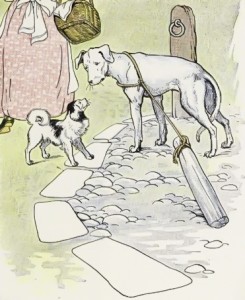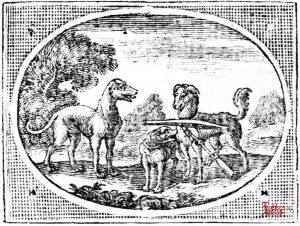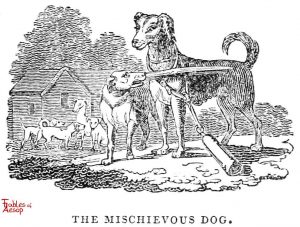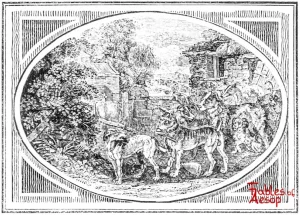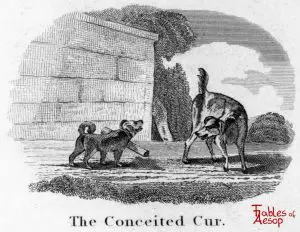A bad dog was given a collar so people could be warned at his approach. The dog thought it a good thing and was proud of it. He was wrong.
Notoriety should not be mistaken for fame.
A Dog snuck up on everyone he met and nipped at their heels. His master tired of the complaints and tied a bell around the Dog’s neck so he could no longer sneak up on people. Thinking this a mark of distinction, the Dog proudly marched through the market ringing his bell. One day an older hound remarked: “Why do you exhibit yourself so? The bell you ring is a mark of disgrace, not merit; it is a notice to all to avoid you.”

Aesop For Children
There was once a Dog who was so ill-natured and mischievous that his Master had to fasten a heavy wooden clog about his neck to keep him from annoying visitors and neighbors. But the Dog seemed to be very proud of the clog and dragged it about noisily as if he wished to attract everybody’s attention. He was not able to impress anyone.
“You would be wiser,” said an old acquaintance, “to keep quietly out of sight with that clog. Do you want everybody to know what a disgraceful and ill-natured Dog you are?”
Moral
Notoriety is not fame.

V.S. Vernon Jones Version
There was once a Dog who used to snap at people and bite them without any provocation, and who was a great nuisance to every one who came to his master’s house. So his master fastened a bell round his neck to warn people of his presence. The Dog was very proud of the bell, and strutted about tinkling it with immense satisfaction. But an old dog came up to him and said, “The fewer airs you give yourself the better, my friend. You don’t think, do you, that your bell was given you as a reward of merit? On the contrary, it is a badge of disgrace.”
Moral
Notoriety is often mistaken for fame.

Samuel Croxall
A CERTAIN man had a Dog which was so curst and mischievous, that he was forced to fasten a heavy clog about his neck, to keep him from running at, and worrying people. This the vain cur took for a badge of honourable distinction; and grew so insolent upon it, that he looked down with an air of scorn upon the neighbouring Dogs, and refused to keep them company. But a sly old poacher, who was one of the gang, assured him, that he had no reason to value himself upon the favour he wore, since it was fixed upon him rather as a mark of disgrace than of honour.
THE APPLICATION
Some people are so exceeding vain, and at the same time, so dull of apprehension, that they interpret every thing by which they are distinguished from others, in their own favour. If they betray any weaknesses in conversation, which are apt to excite the laughter of their company, they make no scruple of ascribing it to their superiority, in point of wit. If want of sense or breeding (one of which is always the case) disposes them. to give or mistake affronts, upon which account all discreet sensible people are obliged to shun their company, they impute it to their own valour and magnanimity, to which they fancy the world pays an awful and respectful deference. There are several decent ways of preventing such turbulent men from doing mischief, which might be applied with secrecy, and many times pass unregarded, if their own arrogance did not require the rest of mankind to take notice of it.

Thomas Bewick (The Mischievous Dog)
A certain Man had a Dog which was so ferocious and surly, that he was compelled to fasten a heavy clog to his collar, to keep him from running at and indiscriminately seizing upon every animal that came in his way. This the vain Cur took for a badge of honourable distinction, and grew so insolent upon it, that he looked down with an air of scorn upon the neighbouring Dogs, and refused to keep them company: but a sly old poacher, who was one of the gang, assured him that he had no reason to value himself upon the favour he wore, since it was fixed upon him as a badge of disgrace, not of honour.
APPLICATION.
The only true way of estimating the value of tokens of distinction, is to reflect on what account they were conferred. Those which have been acquired for virtuous actions, will be regarded as illustrious signs of dignity; but if they have been bestowed upon the worthless and base, as the reward of vice or corruption, all the stars and garters, and collars of an illustrious order,—all the tinsel glories in which such creatures may strut about in fancied superiority, will not mask them from the sight of men of discernment, who will always consider the means by which their honours have been obtained, and truly estimate them as badges of abasement and disgrace.
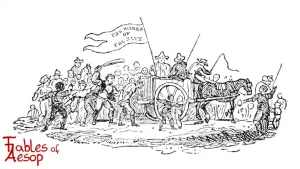

Jefferys Taylor (The Conceited Cur)
I HAVE read in a book of a mischievous dog,
Round whose neck there was fasten’d a large wooden log,
For reasons I need not declare;
But, not seeming to know for what purpose ’twas made,
He ran to his friends and acquaintance, and said,
“See, what a smart collar I wear!”
“We see it distinctly,” a mastiff replied;
“But strongly advise you the honour to hide,
Which is what we should certainly do;
For instead of exciting the smallest respect,
It strongly implies, when we come to reflect,
That you’ve had a sound horse-whipping too.”
I will not affirm that I ever have known
Any lad not ashamed his fools-cap should be shown;
Yet many there are that with ease could be named,
Who can show their fool’s-tricks without feeling ashamed.

JBR Collection
A certain man had a Dog which worried so many people, that he was obliged to fasten a heavy clog about his neck to stop him from such sport in future. This the stupid cur took to be a mark of honourable distinction, and grew so vain in consequence that he turned up his nose at all the dogs he met. A sly old fellow, however, assured him that so far from having any cause to be proud of his burden, it was, on the contrary, a sure sign of disgrace.

Townsend version
A Dog used to run up quietly to the heels of everyone he met, and to bite them without notice. His master suspended a bell about his neck so that the Dog might give notice of his presence wherever he went. Thinking it a mark of distinction, the Dog grew proud of his bell and went tinkling it all over the marketplace. One day an old hound said to him: “Why do you make such an exhibition of yourself? That bell that you carry is not, believe me, any order of merit, but on the contrary a mark of disgrace, a public notice to all men to avoid you as an ill mannered dog.”
Moral
Notoriety is often mistaken for fame.

Canis Mordax
Cani, saepius homines mordenti, illigavit dominus nolam, scilicet ut sibi quisque caveret. Canis, ratus virtuti suae tributum hoc decus esse, populares omnes despicit. Accedit tandem ad hunc canem aliquis, iam aetate et auctoritate gravis, monens eum ne erret. “Nam ista nola,” inquit, “data est tibi in dedecus, non in decus.”
Perry #332
